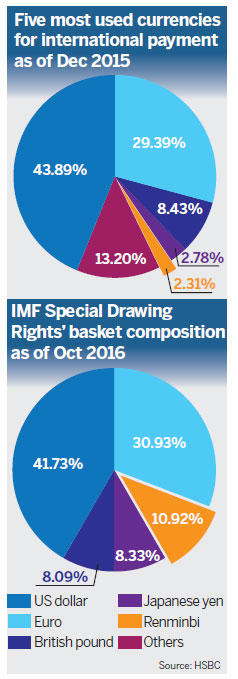PBOC chief's remarks boost yuan
Updated: 2016-02-16 09:39
By Emma Dai in Hong Kong(HK Edition)
|
|||||||||
The renminbi continued to gain ground against the US dollar on Monday, fueled by uncertainties over economic recovery in the US, as well as remarks by the head of the People's Bank of China (PBOC) that there's no basis for the Chinese currency to depreciate further.
The renminbi advanced 0.33 percent, or 214 basis points, to hit its strongest level so far this year at 6.4872 yuan per US dollar in the offshore market on Monday - the first trading day on the Chinese mainland after the Spring Festival holidays.
The offshore yuan, or CNH, was traded at 6.4968 yuan against the greenback as of 8:06 pm in Hong Kong.
The redback rallied in the onshore market as well after trading was suspended for five days for the holiday break. The China Foreign Exchange Trade System (CFETS) set the daily fixing rate at 6.5118 yuan per US dollar on Monday, 196 points stronger. In Shanghai, the yuan closed at 6.4944 on Monday.
The yuan rally reflects panic dumping of US dollars by offshore investors, who had accumulated a good amount of long dollar positions before the holidays, said Wang Ju, senior foreign exchange strategist at HSBC.
"Over the past few days, the (US) dollar has weakened significantly against a number of major global currencies. Yet, in the CNH market, there were few counter parties to trade with due to the Spring Festival break. Dollar bears have been eager to liquidate their long dollar positions," she explained.
In the first two weeks of this month, both the euro and the yen had strengthened against the US dollar - by 3.5 percent and 7 percent, respectively.
The rally was spurred by fears that US economic recovery may not be as buoyant as expected and the US Federal Reserve wouldn't be able to raise the Federal funds rate for four times as previously anticipated.
"The December figures show lackluster PMI (Purchasing Managers Index) and car sales in the US. Investors have been risk-off and buying other major currencies," said Liu Ligang, Greater China chief economist at ANZ.
Liu added that the jump-start of the renminbi daily fixing rate on Monday was in line with the PBOC's plan to peg the renminbi to a trade-weighted basket of currencies, of which the euro and the yen combined account for 36 percent.
"Monday's move is encouraging. It shows that China's foreign-exchange rate mechanism is flexible, which is necessary for the country to maintain an independent monetary policy while opening up its capital account. Along with the remarks by the PBOC chief, market confidence on China's reform is enhanced," Liu added.
Central bank governor Zhou Xiaochuan said in an interview with Caixin - a Chinese-language magazine - that the authorities would be patient and wait for the right opportunity windows to carry on reforms, and strike a balance with growth and stability.
He emphasized that there's no reason for continued renminbi depreciation. The central bank will continue to target a foreign-exchange regime based on market supply and demand with reference to the basket of currencies, in order to maintain broad exchange-rate stability.
The CFETS' trade-weighted RMB Index published on Monday showed a reading of 99.23 on Feb 5 - depreciating by 0.77 percent compared with the end of 2014.
"These comments signal there's no intention of a sharp one-off devaluation, but they leave scope for further rounds of gradual and managed depreciation in what might be thought of as a continued search for a reasonable and balanced RMB level," said MK Tang, an economist at Goldman Sachs.

(HK Edition 02/16/2016 page9)